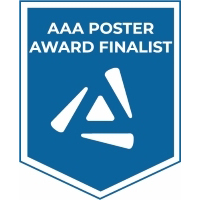Back
ANATOMY
Category: Anatomy
Session: 481 Cell Biology
(481.2) ARHGAP29 Regulates Keratinocyte Migration through the RhoA/ROCK Pathway
Sunday, April 3, 2022
10:15 AM – 12:15 PM
Location: Exhibit/Poster Hall A-B - Pennsylvania Convention Center
Poster Board Number: C108
Introduction: AAA has separate poster presentation times for odd and even posters.
Odd poster #s – 10:15 am – 11:15 am
Even poster #s – 11:15 am – 12:15 pm
Introduction: AAA has separate poster presentation times for odd and even posters.
Odd poster #s – 10:15 am – 11:15 am
Even poster #s – 11:15 am – 12:15 pm
Lindsey Rhea (The University of Iowa), Bailey Garnica (The University of Iowa), Tanner Reeb (The University of Iowa), Elliot Dunnwald (The University of Iowa), Martine Dunnwald (The University of Iowa)
Lindsey Rhea
Presenting Author
The University of Iowa
Presenting Author(s)
Genetic variants in Rho GTPase Activating Protein 29 (ARHGAP29) have been associated with non-syndromic cleft lip and/or palate, one of the most common human birth defects. Orofacial clefting results from the failure of facial processes to fuse during development which can be caused by defects in proliferation, adhesion, and/or migration. ARHGAP29 is widely expressed and preferentially interacts with the small GTPase RhoA, a critical modulator of the actin cytoskeleton required for cell morphology and migration. Therefore, we hypothesized that ARHGAP29 would play a critical role in keratinocyte migration. To test this hypothesis, we knocked down ARHGAP29 in a human keratinocyte cell line using both shRNA and CRISPR technologies. To assess migration, we used an in vitro scratch assay on a confluent keratinocyte monolayer and followed scratch closure over 24 hours. ARHGAP29 knockdown keratinocytes displayed significantly increased cell area and significant delays in scratch closure. By tracing single cells throughout the duration of scratch closure, we found that ARHGAP29 knockdown cells were significantly slower and showed defects in directionality that were rescued with a ROCK inhibitor, Y-27632, suggesting these migration defects are downstream of the RhoA pathway. Collectively, our results demonstrate that ARHGAP29 regulates keratinocyte morphology and promotes migration speed and directionality through the RhoA/ROCK pathway, providing potential insight into its importance in craniofacial development.
Support or Funding Information
National Institute of Arthritis and Musculoskeletal and Skin Diseases, Grant/Award Number: AR067739
Support or Funding Information
National Institute of Arthritis and Musculoskeletal and Skin Diseases, Grant/Award Number: AR067739

